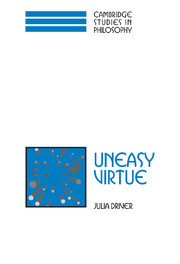Conclusion
Published online by Cambridge University Press: 22 July 2009
Summary
The purpose of this book has been to set out and defend an objective consequentialist account of moral virtue. It has not been to defend a complete account of objective consequentialist moral evaluation, though I believe such an account to be the correct one.
In the course of arguing for this view, I have attempted to make distinctions that I also believe help to clarify crucial differences between different accounts of moral virtue. I have also tried to show that the classical account is deeply flawed – in a way, an intellectually elitist account that places enormous psychological requirements on moral virtue. Of course, the view I propose, at the other end of the spectrum, will to many people have the opposite problem of making virtue too easy and accessible – perhaps I should have called the book Easy Virtue. But this inference would be a mistake. Virtue may or may not be easy for the agent. That's the whole point behind the attempt to deflate the conflict between Aristotle and Kant. After all, for Aristotle, once the virtuous agent has the virtue, it starts looking easy too. My account simply holds that a trait that is good-producing – however acquired – is a moral virtue. It may be contingently true that these traits tend to be ones that we have to work hard to acquire and that require some effort to maintain. My view is simply that this is not a necessary feature of moral virtue.
- Type
- Chapter
- Information
- Uneasy Virtue , pp. 109 - 110Publisher: Cambridge University PressPrint publication year: 2001



